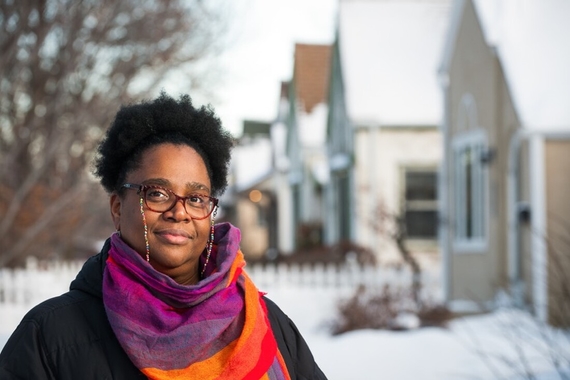National Book Award winner Miles champions others’ journeys
For writers in the United States, the National Book Award (NBA) is among the most coveted. And it is just one of the awards richly deserved and earned by Tiya Miles (PhD ‘00, American studies). All That She Carried: The Journey of Ashley’s Sack, a Black Family’s Keepsake (Random House) brought Miles the NBA, and most recently the 2022 PEN American Literary Award.
Miles has earned a place among the nation’s most respected and esteemed historians and is dedicated to revealing, honoring, and preserving stories of Black and Indigenous people who endured and lived with grit and tenacity. Her acclaimed work illuminates how it is essential for us to acquire a deeper, accurate understanding of our culture in order to move toward an inclusive, just society.
Her other books include Ties That Bind: The Story of an Afro-Cherokee Family in Slavery and Freedom (University of California Press), The House on Diamond Hill: A Cherokee Plantation Story (University of North Carolina Press), Crossing Waters, Crossing Worlds: The African Diaspora in Indian Country (co-editor, Duke University Press), and The House on Diamond Hill: A Cherokee Plantation Story (University of North Carolina Press).
Before earning her doctorate at UMN, Miles received an AB in Afro-American studies from Harvard University and an MA in women’s studies from Emory. A seasoned educator, Miles is a professor of history at Harvard; Radcliffe Alumnae Professor, Harvard Radcliffe Institute; and director of the Charles Warren Center for Studies in American History. Her research and eloquent perspectives on race, feminism, and identity, women’s history, and Black and Native interrelated experience are found in numerous platforms including National Public Radio, The New York Times, CNN in America, and Huffington Post, and many of her lectures and commentary are available on YouTube.
In the midst of a sabbatical to work on her next book, Professor Miles graciously took time to answer questions particularly appropriate for Women’s History Month:
Who are the women among your heroes and why?
We could fill a whole book with my women heroes. In fact, I am currently preparing to write a few books that could be categorized in this way, if we can agree that heroes have flaws and make mistakes just like everyone else. My next book will be a short take on a series of women who changed United States history and developed consequential skills as girls in the outdoors. I have also begun research on the 19th-century abolitionists Harriet Tubman and Harriet Jacobs and on the 20th-century science fiction and fantasy writer Octavia E. Butler.
My grandmother, Alice Stribling Banks, who was born and raised in rural Mississippi, has always been like a beacon in my life. She was keen, brave, generous, honest, an astute analyst of social and political relations, and an incredibly skilled storyteller. I wish I had voice recordings of her scathingly funny verbal takedowns of the Mississippi public safety commissioner and anti-civil rights advocate Bull Connor. I try to follow my grandmother’s lead and her values, but I admit that I will never be half the cook she was or nearly as devoted to defending Princess Diana’s honor as she was.
With what you've given voice to as a historian, are you more hopeful or more fearful for women in the future?
I have hope and fear in equal parts. I think we must be honest with ourselves and especially with young people and admit that current national and global circumstances are bleak and that the challenges we collectively face are complex and massive. However, we cannot let fear bury us. We must keep looking for the good in every person we meet, seeking to be helpers, and trying to express gratitude. We must keep engaging in good faith with our communities, our civil society, our government, and our global counterparts.
You write about how your first novel, The Cherokee Rose, presented you with the opportunity to integrate your imagination with your previous research. Has that flow of imagination worked in the other direction…taking your approach to fiction into non-fiction?
Here is a secret: when I was in American studies at UMN, I wanted to write a novel about African American and Cherokee relations in the 19th-century Cherokee Nation rather than writing an analytical dissertation. (In college at Harvard, I had taken creative writing courses and worked on the editorial staff of the Black literary journal, Diaspora. While at UMN, I squeezed a fiction-writing seminar in the English department into my schedule. I also took an evening mystery-writing course with the award-winning Minnesota author Ellen Hart and participated in a competitive program for new writers at the Loft Literary Center where I had the privilege of learning from the pathbreaking fantasy author Jewelle Gomez and of giving my first public creative reading.) The Director of Graduate Studies in American Studies denied my petition to write a creative dissertation.
At the time, I was disappointed by that decision. Now, I thank her for it. My dissertation became my first book, Ties That Bind: The Story of an Afro-Cherokee Family in Slavery and Freedom (2005; expanded edition 2015); that book won first book prizes from the American Studies Association and the Organization of American Historians. It was among several new books by early-career historians (such as Claudio Saunt, Celia Naylor, Barbara Krauthamer, and UMN history professor David Aiona Chang) that came out within the same decade and together transformed the way that Native American history/studies recognized Black people, Afro-Indigenous people, and anti-Black prejudice, as well as the way that African American history/studies contended with memories of historical relations with Native Americans, widespread claims of Native ancestry, and questions of Indigenous land and sovereignty.
The historical thinking that I did for my first work of history/American studies and for my subsequent academic books have profoundly shaped my creative imagination and the kind of fiction that I feel compelled to write.
And, looping back to the actual question you asked me: yes, my creative writing does influence my historical writing. In all my books (and increasingly as my career has progressed), I have endeavored to apply fiction and creative nonfiction techniques to the way I choose historical topics or stories, arrange narratives, describe historical actors and events, and select language. For example, I worked out the outline and narrative arc of my prize-winning history, The Dawn of Detroit, in my cabin at the Bear River Writers Conference, an annual event featuring workshops and craft talks for creative writers organized by the University of Michigan English Department.
What was one of the greatest challenges you faced in writing All that She Carried and how did you handle it?
Around a year into the research for All That She Carried: The Journey of Ashley’s Sack, a Black Family Keepsake, I was uncertain about whether I could write a full-length book about the subject. The primary sources that I had hoped I might be able to uncover were just not turning up. At the same time, I felt utterly compelled by the story of this material object and the enslaved Black women who used and cared for it. I felt stuck, in a sense, between my urgent desire to tell this story and my knowledge that the historical record was alarmingly thin about the sack and the 19th-century women who passed it down to future generations. In the end, this obstacle became a strength of the book. It forced me to be more imaginative in my research and in my approach to the writing, by extending what I would use as primary sources and how I would interpret and narrate the history of Rose, Ashley, Ruth, and their treasured textile.
Describe one of the most meaningful, memorable learning experiences or relationships in your CLA life.
At Minnesota, I was a graduate student in the Department of American Studies, and while there, I took several classes with the history department faculty. I learned from my peers in both departments. There are many tales I could tell about the growth I experienced during that time, including learning where the tunnels were and how to drive in Minnesota winters! I also benefited tremendously from working with advisors with expertise in both African American history and Native American history and literature, namely: Professors David Roediger, Carol Miller, Jean O’Brien, Brenda Child, and Angela Dillard. Professor Lisa Norling’s women’s history seminar was also pivotal for me; her class introduced me to archival work (reading the letters of incarcerated women at the state archives) as well as to my model of historical scholarship, Laurel Thatcher Ulrich’s book, A Midwife’s Tale.
The relationship that I want to emphasize here, though, is the one I shared with American Studies graduate student Josie Fowler, who was a year or two ahead of me in the PhD program and passed away in 2006 not long after we completed our degrees. Josie Fowler was a sensitive labor historian and intuitive creative writer. She is the single person at UMN with whom I shared the depth of my personal interest in creative writing. She gave me a handwritten copy of an Emily Dickinson poem that she thought could be inspirational for my dissertation; she was right.
We formed a mini writing group together, and we read and offered feedback on each other’s non-academic work. When I was between housing in Minneapolis, Josie invited me to stay in her lovely vintage apartment in Uptown. When Josie went on research trips, she brought me back kitsch trinkets, a few of which I still have in my office. I remember how Josie used to joke about the need to put our words down on the page rather than sitting around “eating bonbons.” This was a hilarious image to me because I had never even had a bonbon. I cherish the memory of the unique friendship Josie and I had, and I think it is remarkable that many of our peers in American Studies feel the same way. The light and encouragement that Josie brought to my imaginative life remain with me still. I dedicated my novel, The Cherokee Rose, to Josie’s memory and to the memories of the filmmaker Helen Hill, and the historian Peggy Pascoe. All three were women intellectuals and champions of others’ journeys who died too young and are deeply missed.
Imagine you're not in your current role and have the opportunity to do anything. What would you do?
I seriously considered three potential graduate school and career tracks after college: pursuing a doctorate and becoming a scholar and teacher; getting an MSW and running a women’s center or shelter, or seeking an MFA and becoming a writer.
I have had opportunities to work in all three of these fields to some extent because American Studies and the academy are both flexible contexts in which to work, allowing for the development of grant-funded community-based initiatives (such as my previous project at the University of Michigan, ECO Girls), and for a focus on creative writing and editorial writing during summers, holidays, and weekends.
If I could imagine a wholly different career, I think I would want to establish and operate a site for retreat, connection, healing, and rejuvenation for writers, academics, and social entrepreneurs.
If you could tell your younger self one thing, what would it be?
This is a tough question! I would want to pass on many pieces of advice that I have learned from others and from my own experiences, both positive and negative. Since you are asking for one thing, I will say that I would have urged my younger self to keep going, to not give up on hopes or dreams even when things seemed daunting. I do think that time soothes many emotional wounds and that unexpected relationships of support and opportunities for growth and achievement are often just around the next bend.
Learn more about the Josie Fowler Peace and Justice Prize
Tiya Miles was among many inspired by Josephine Fowler, who died of breast cancer in 2006, just three years after completing her PhD in American studies. Although Fowler's life spanned just 49 years, she left a remarkably rich, impassioned, and accomplished legacy.


